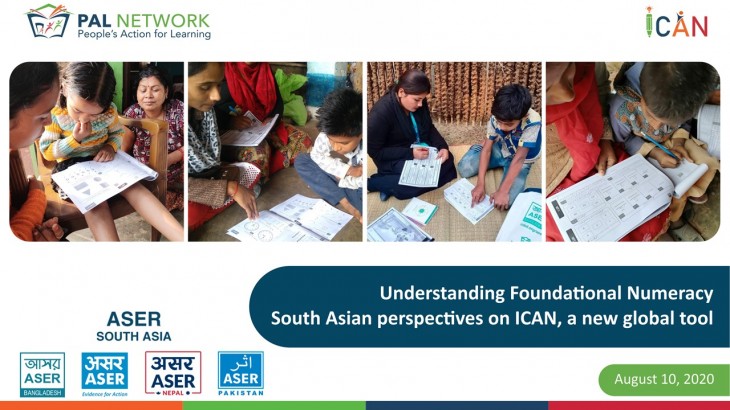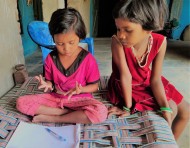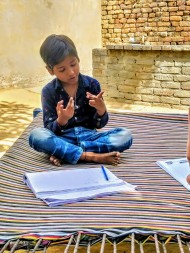
ASER Centre
Evidence for action- Home
- About Us
- ASER Survey
- Research & Assessment
- Capacity Building
- Publications & Reports
- ASER Reports
- ASER Data Over Time
- ASER 2022: Chhattisgarh
- ASER 2022 'Young Children'
- ASER 2022
- ASER 2021: West Bengal
- ASER 2021: Chhattisgarh
- ASER 2021
- ASER 2020 Wave 1
- ASER 2020 Digital Recheck
- ASER 2020: Karnataka
- ASER 2019
- ASER 2018 'Young Children'
- ASER 2018
- ASER 2017
- ASER 2016
- ASER 2015: Maharashtra
- ASER 2015 : Punjab
- ASER 2014
- ASER 2013
- ASER 2012
- ASER 2011
- ASER 2010
- ASER 2009
- ASER 2008
- ASER 2007
- ASER 2006
- ASER 2005
- Odisha Tribal Study 2022
- ASER Health Report
- Study on Access, Transition and Learning in Secondary Education
- India Early Childhood Education Impact Study
- Urban Ward Surveys
- Bihar Elementary School Study
- Inside Primary Schools
- PAHELI
- External Publications
- ASER Reports
- Data Query
- Impact
ASER Collaborates with Street Child to Strengthen South Asian Assessment Alliance
ASER Centre in collaboration with Street Child UK has embarked upon implementing an Education Out Loud OC3 project:The South Asian Assessment Alliance: Communication and Collaborating for Change.This Oxfam IBIS / GPE funded project aims to create a transnational alliance of actors to (i) monitor educational allocations and activities; and (ii) ensure their effectiveness and efficiency in order to ensure quality, equitable education for most marginalised children and communities. The project covers Afghanistan: KHANA; Bangladesh: Wave Foundation; Myanmar: Ashoka; and Nepal: ASER Nepal
The stated objectives of the project are:
1.Increase availability and access to assessments amongst citizens and communities.
2.Increase analysis and active use of assessments to advocate for evidence-informed, equity-focused educational interventions.
3.Increase engagement with evidence to enact and embed evidence-informed, equity-focused educational interventions.
4.Increase accountability towards transnational targets in education, including the Education 2030 Framework for Action and SDG 4.
ASER South Asia hosts a webinar on “Understanding foundational numeracy: South Asian perspectives on ICAN, a new global tool” on August 10, 2020

Pratham’s very first ASER survey was implemented fifteen years ago this year. With the exception of 2015, the ASER report has been released like clockwork in January each year since then. Key features of ASER include the importance of conducting household-based rather than school-based assessmentsto reach all children; a focus on oral, one-on-one assessment of foundational reading and arithmetic; a simple design that facilitates ease of administration as well as understanding of the results; and clear links between assessment results and action on the ground to improve them.
The ASER approach to measurement has resonated across the Global South. In these fifteen years, it has been adopted and adapted by organizations in Africa (Kenya, Tanzania, Uganda, Nigeria, Mali, Senegal, Mozambique, Botswana); America (Mexico and Nicaragua); and Asia (Pakistan, Bangladesh, Nepal). In 2015, these organizations came together to establish the People’s Action for Learning (PAL) Network in order to advance our common agenda on ensuring that all children acquire at least basic reading and arithmetic skills.Together, PAL Network members reach and assess more than a million children.
Today, the importance of measuring foundational reading and numeracy in early grades is widely acknowledged, and is reflected in indicator 4.1.1(a) of the global Sustainable Development Goal for education (SDG 4). However, tracking progress towards this goal has been hampered due to lack of data: none of the existing large scale assessment models like TIMSS and PISA are able to generate comparable data on children’s foundational skills in early grades. In 2018, PAL Network members took on the challenge of developing such a model.
Inspired and informed by these fifteen years of Pratham’s work with ASER and similar efforts in other countries, the International Common Assessment of Learning, or ICAN, was released this month. ICAN is an open-source, robust and easy-to-use tool that assesses foundational numeracy and is available in 11 languages.When ASER started in 2005, the difference between schooling and learning was neither commonly accepted nor well understood, and Pratham’s consistent emphasis on foundational skills and the importance of simple, robust tools to measure them have been instrumental in changing this landscape, not only in India but across the world. The ICAN initiative is evidence of this trajectory.
As the world grapples with defining the 'new normal' in the wake of COVID-19, tools like ICAN can provide rapid, cost-effective, easily scalable mechanisms that can help to understand how best to support children's learning.
The South Asia hub of the People's Action for Learning (PAL) Network (ASER Bangladesh, ASER India, ASER Nepal and ASER Pakistan) hosted a webinar on “Understanding foundational numeracy: South Asian perspectives on ICAN, a new global tool” on August 10.
Download your copy of the ICAN Report here.
View the presentation made during ASER South Asia's webinar here.
View the ICAN tool in the following languages:





Introduction to ICAN: ASER South Asia Webinar
Introduction to ICAN 2020: ASER South Asia Webinar
Panel Discussion: ASER South Asia Webinar
Panel discussion: ASER South Asia Webinar
Way forward: ASER South Asia Webinar
Way forward: ASER South Asia Webinar
© 2025 ASER CENTRE | B 4/58 Safdarjung Enclave, New Delhi 110 029 | 91 11 4602 3612 / 2671 6084